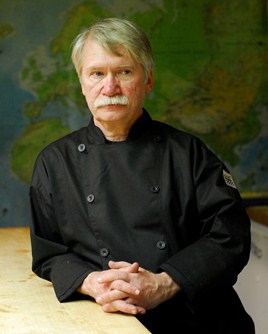Guest Speaker: Staff Meal—It’s All about Team
11 September 2012
 Says this career educator, whether students in your program have a practice restaurant or not, teaching respect for the staff meal and how it contributes to a sense of team will follow your graduates to the kitchens that they work in and eventually run.
Says this career educator, whether students in your program have a practice restaurant or not, teaching respect for the staff meal and how it contributes to a sense of team will follow your graduates to the kitchens that they work in and eventually run.
By Paul Sorgule, MS, AAC
I just finished watching the United States Girls Gymnastics Team complete an impressive collaborative win. What was most impressive was not their individual athleticism (incredible), but more importantly how they worked together, felt together, supported each other and fed off of each other’s strengths. This is such an impressive feat that I naturally began to think about how this same energy and working philosophy could be imbedded in a culinary-school curriculum. The significance of team is what it’s all about.
I had the privilege many years ago of participating as a member of the 1988 U.S. New England Culinary Olympic Team, an experience that changed my entire outlook on life and my profession. We became a family and learned through trial and error to build on each other’s strengths and accept and help each other with our weaknesses. Yes, we very successful in the Frankfurt “Olympics,” but more importantly we discovered what it meant to get past teamwork and move on to “team.”
Team members can be recognized for the following traits and aptitudes:
- They are honest with each other (sometimes brutally honest)
- They put the well-being of the team above their own personal accomplishments
- They do their homework and contribute at the highest individual level
- They have each other’s backs
- They accept their role in the moment, even if it is not what they would prefer to be doing
- They take pride in their team members’ accomplishments as much as their own
- They are great listeners and offer their opinions when beneficial
- They are extremely dependable
- They do not accept personal mediocrity
- They are truly interested in each other, what members have to say, their experiences, their issues and their challenges
- They achieve the results that they seek
Now, how do we build this into a curriculum? There are ample opportunities that stem from providing environments where team dynamic happens. The more chances that students have to work in cohorts (it is important to give the team ample time to gel), creating challenging projects that require team activity, giving cohorts a chance to evaluate their own collective work, and one that is so important: Create energy around staff meal.
Whether students in your program have a practice restaurant or not, the instructor can always create opportunities for a staff meal around the work that is done in classroom kitchens. If possible, give students an opportunity to reflect their ethnic background in cooking for the team and then stimulate conversation about that heritage, the food and how it was prepared, their individual experiences at home with their ethnic culinary background, and a healthy critique about the flavors presented. Breaking bread is one of the best ways to build trust, honesty and team.
This respect for the staff meal and how it contributes to a sense of team will follow your graduates to the kitchens that they work in and eventually run. They will quickly learn that great food and service comes from great employees. The staff meal is just as important as the food that is served to a restaurant’s guests.
When your students are in a position to take a leadership role in a kitchen, it will be their ability to build and support a team of like-minded professionals that will set them on a course to success. Individual talent does not lead to flawless execution of a menu, customer satisfaction and longevity of staff. It will always be that sense of a common goal and the satisfaction of working with people who you can trust to perform that separates an average restaurant from a great one.
Paul Sorgule, MS, AAC, president of Harvest America Ventures, a “mobile restaurant incubator” based in Saranac Lake, N.Y., is the former vice president of New England Culinary Institute and a former dean at Paul Smith’s College.
Additional Info
- CAFÉ Talks Podcast Lesson Plan: 8
